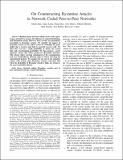On Counteracting Byzantine Attacks in Network Coded Peer-to-Peer Networks
Author(s)
Medard, Muriel; Zhao, Fang; Kim, MinJi; Lima, Luísa; Koetter, Ralf; Barros, Joao; Kalker, Ton; Han, Keesook J.; ... Show more Show less
DownloadMedard_On counteracting.pdf (1.571Mb)
OPEN_ACCESS_POLICY
Open Access Policy
Creative Commons Attribution-Noncommercial-Share Alike
Terms of use
Metadata
Show full item recordAbstract
Random linear network coding can be used in peer-to- peer networks to increase the efficiency of content distribution and distributed storage. However, these systems are particularly susceptible to Byzantine attacks. We quantify the impact of Byzantine attacks on the coded system by evaluating the probability that a receiver node fails to correctly recover a file. We show that even for a small probability of attack, the system fails with overwhelming probability. We then propose a novel signature scheme that allows packet-level Byzantine detection. This scheme allows one-hop containment of the contamination, and saves bandwidth by allowing nodes to detect and drop the contaminated packets. We compare the net cost of our signature scheme with various other Byzantine schemes, and show that when the probability of Byzantine attacks is high, our scheme is the most bandwidth efficient.
Date issued
2010-06Department
Massachusetts Institute of Technology. Department of Electrical Engineering and Computer Science; Massachusetts Institute of Technology. Research Laboratory of ElectronicsJournal
IEEE journal on selected areas in communications
Publisher
Institute of Electrical and Electronics Engineers
Citation
MinJi Kim et al. “On counteracting Byzantine attacks in network coded peer-to-peer networks.” Selected Areas in Communications, IEEE Journal on 28.5 (2010): 692-702. © 2010, IEEE
Version: Author's final manuscript
Other identifiers
INSPEC Accession Number: 11325682
ISSN
0733-8716